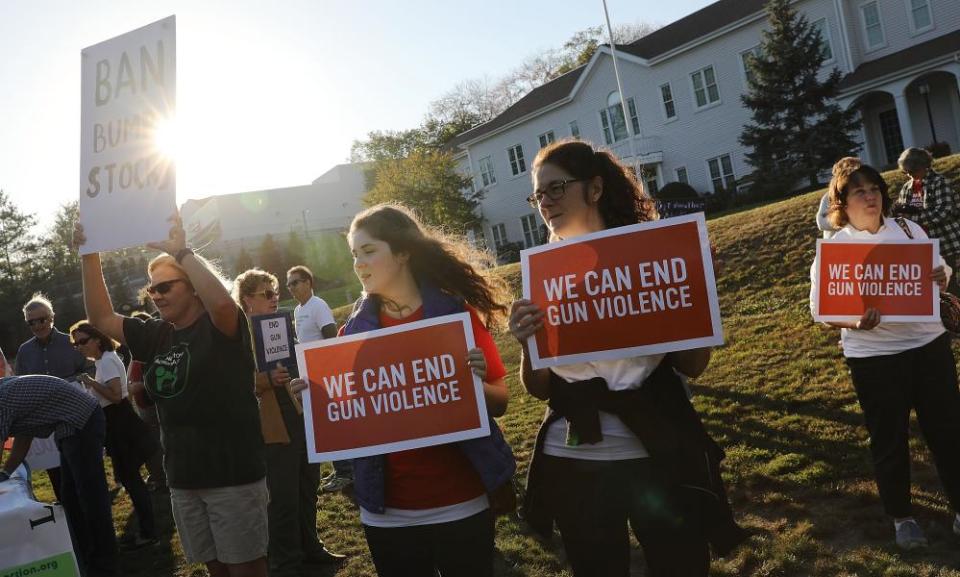Sandy Hook families argue in court gun companies 'courted' shooter
Family members of Newtown victims say gun companies’ macho advertising for AR-15-style rifles helped draw Adam Lanza to ‘the weapon he needed’

A lawyer for the family members of victims of the Sandy Hook elementary school shooting argued gun companies were negligent to market a dangerous military-style weapon to civilians in court on Tuesday.
Family of the victims were in court once again to fight an uphill battle to hold gun companies accountable for marketing and selling the AR-15-style rifle used to kill 20 children and six adults in December 2012. They have put a spotlight on gun companies’ macho, militaristic advertising for these rifles.
“Remington may never have known [Sandy Hook shooter] Adam Lanza, but they had been courting him for years,” Josh Koskoff, an attorney for the Sandy Hook plaintiffs, told a packed Connecticut supreme court hearing on Tuesday morning.
“The weapon he needed for his mission that day was never in doubt,” Koskoff said, explaining the Bushmaster AR-15 style rifle the shooter used had been marketed as “the uncompromising choice when you demand a rifle as mission-adaptable as you”.
Legal experts have said the Sandy Hook families’ case is unlikely to succeed, thanks to a 2005 federal law designed to shield gun companies from liability when their products are misused by criminals. Last year, a Connecticut superior court judge struck down the Sandy Hook case, ruling, as their attorneys had argued, that the gun companies are protected from the lawsuit by that law.
With Republicans in Congress blocking any national action on stricter gun control laws, including a renewed ban on military-style weapons, the families of nine victims and one survivor of the 2012 shooting have appealed to the state supreme court. Part of the goal of their lawsuit, they have said, is to get access to the internal marketing documents of gun companies and shed light on the companies’ strategies for selling military-style guns to a civilian market.
Lawyers for the gun companies emphasized that the seller was not responsible for the shooting, which was done with a rifle that had been legally purchased by Lanza’s mother.
“No matter how tragic, no matter how much you wish those children and their teachers were not lost, their families had not suffered, the law needs to be applied dispassionately,” James Vogts, the attorney for Remington Arms, a major gun manufacturer, told the court. “The sellers of the firearm used by the criminal that day are not legally responsible for his crime and the harm that he caused.”
Vogts defended the marketing slogans for the Bushmaster XM-15 E2S rifle, saying that a slogan like “force of opposition, bow down” could be referring to self-defense in the home.
“To protect myself and my family, I would want to choose a firearm that would force whatever opposition I was confronted with to bow down,” he said.
The lawsuit is being closely watched by the US firearm industry and the National Rifle Association, and has become rallying point for gun control advocates.
The latest hearing comes less than two weeks after a gunman used the AR-15-style rifle, the semi-automatic civilian version of a military M-16, to kill 25 people, many of them children, at a small church in Sutherland Springs, Texas.
The gun companies “could not care less what happens to their guns once the cash is in the bank”, Ian Hockley, the father of Dylan Hockley, the British-born six-year-old who was killed at Sandy Hook, said during a brief press conference after Tuesday’s hearing. “They actively market the weapon to unstable individuals.”
The families, whose children, killed at six and seven, would now be 11 or 12, have “utmost faith in the legal system to serve the people it is meant to protect,” Hockley said. “We have not lost one ounce of confidence in the justice of our case.”
Mark Barden, the father of seven-year-old Daniel Barden, who was murdered at Sandy Hook, told the Guardian the justices’ line of questioning left him optimistic. “It sounded very positive from our side,” he said.
Barden also challenged the Remington attorney’s statement that the gun company’s advertising could be applied to home defense.
“They’re not talking about protecting yourself in your home,” Barden said. “They are illustrating a combat scenario for people who want to fantasize about being in a combat situation.”
But American politicians have tried to protect gun companies from this angle of attack. In 2005, Congress passed a law designed to shield gun companies from liability when their legally sold products are misused by criminals.
The law does not shield companies from lawsuits over faulty products, or over the “negligent entrustment” of a product to someone the seller knows is likely to misuse it. By trying to define the mass marketing of AR-15-style guns to civilians as “negligent entrustment”, the Sandy Hook families are pursuing what experts call a novel legal strategy.
Gun rights groups say that AR-15-style rifles have become one of the most popular consumer guns in the US, safely owned by millions of Americans. They note that government statistics show that rifles of any kind are used in only a tiny fraction of the country’s more than 11,000 gun murders each year.
Larry Keane, the general counsel for the National Shootings Sports Foundation, the trade association for the American firearms industry, declined to comment on the importance of the case to the firearms industry, saying only, “We look forward to the court’s decision.”

